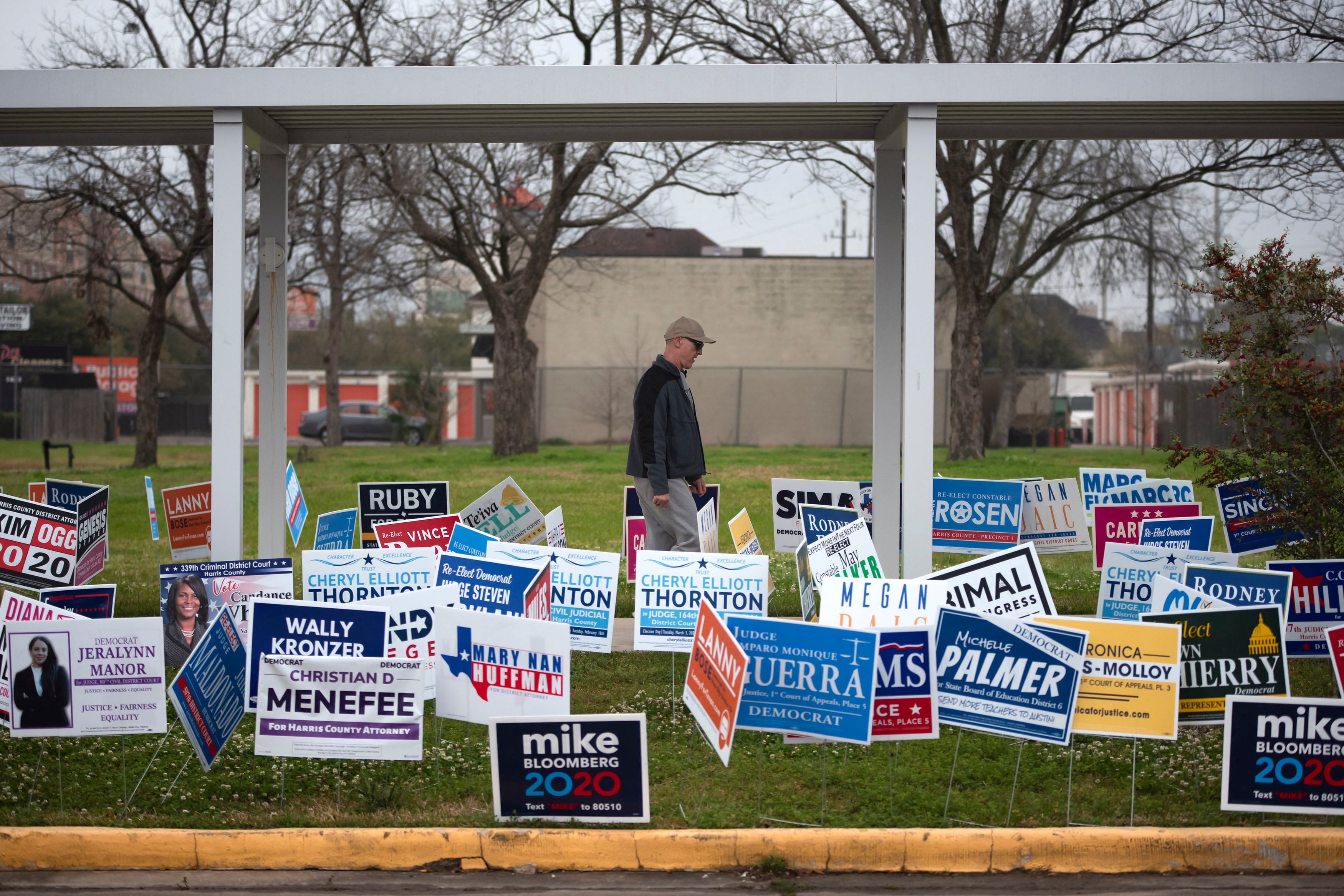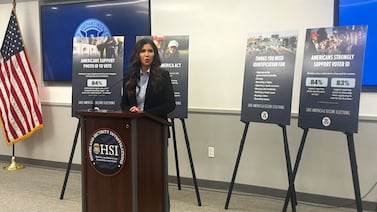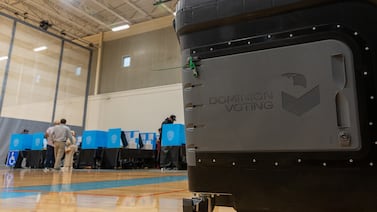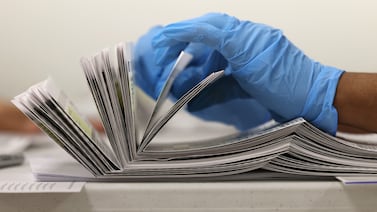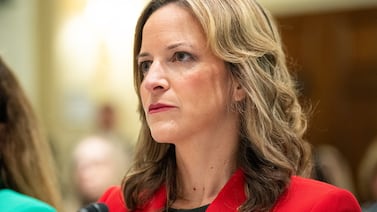Votebeat is a nonprofit news organization reporting on voting access and election administration across the U.S. Sign up for our free newsletters here.
It has been 15 months since Democrat DaSean Jones was sworn in as a Harris County criminal district court judge. He’s presided over hundreds of cases since then. And he’ll be on the ballot again in November, this time for a seat on the Texas Supreme Court.
But there’s an asterisk on his 2022 election win: His opponent, Republican Tami Pierce, is still challenging the outcome in court, arguing that there were “improper or illegal votes that shouldn’t have been counted” and that the election was “plagued with mistakes.” Her case is awaiting a ruling from a Bexar County visiting judge.
It’s another example of a pattern officials and experts say they’re seeing around Texas in recent years: elections that just won’t end.
The November 2020 general election was easily the most litigious in recent history. But post-election legal challenges and recount petitions have been mounting ever since, experts say. And while there are no hard numbers, they say these challenges are becoming more common in lower-ballot elections around the state.
Some level of scrutiny is expected after elections. Texas law requires automatic recounts in some circumstances, including a tie, and it allows for challenges in very close elections.
But the challenges election officials are noticing lately are different. Many are coming from right-wing activists challenging specific aspects of how the election was conducted, and “throwing the kitchen sink” into their complaints, said Mimi Marziani, a political science and election law professor at the University of Texas at Austin.
“They’re not actually trying to have a different person elected,” Marziani said. “They’re trying to set some sort of precedent to destabilize free and fair elections.”
What if the result changes after a candidate takes office?
With the 2024 election just months away, Texas courts are still working through election challenges brought as far back as 2021. Winning candidates like Jones, meanwhile, have taken office but must contend with the uncertainty surrounding their authority, which experts say could diminish voters’ confidence.
Nearly all of these challenges have been dismissed, but as long as some are pending, they leave open the prospect that a court could replace the winning candidate, even well into the term of office.
Lawyers say such instances are rare, but that if that were to happen, the official actions taken by the original incumbent, such as rulings by an elected judge, should stand.
Candidates contesting the results of an election must meet a high evidentiary bar to succeed. A court will take a close look at the vote margin, and challengers must prove that there are illegal votes included in the vote tally, said Chad Dunn, a Texas attorney and election law expert — and enough of them to have shifted the outcome.
“You can’t say that ‘that kind of ballot is not lawful, this kind of ballot is not lawful,’” Dunn said. “The test is whether or not the person who voted was eligible to vote, and they were the person who voted.”
Challenges from past Texas elections linger
Pierce, who lost the 180th District Court judicial race in Harris County by fewer than 500 votes, declined to comment through her attorney, and Jones did not respond to a request for comment.
Pierce is among 21 losing Republican candidates in Harris County who challenged the results of the 2022 general election there. A judge overseeing those cases found that Harris County made errors, but there wasn’t enough evidence to order a new election, and he upheld the election results. Three of the candidates who challenged their results dropped their lawsuits before his ruling.
In Pierce’s case, which has the closest margin of votes according to published results, there was a two-day trial in Harris County last month, and a decision is pending.
Meanwhile, in separate proceedings, the outcome of a November 2021 election is still being disputed in court over the description of a proposed constitutional amendment that was on the ballot. Proposition 2, which voters approved, would allow counties to issue bonds to raise funds for transportation and infrastructure in underdeveloped areas.
Conservative groups, including Grassroots of America, claimed that the description of the proposal on the ballot was misleading to voters. A Travis County District Court ruled in favor of the groups, and after an appeal by the Texas Attorney General’s Office, the 7th Court of Appeals upheld the lower court’s ruling. The state has yet to respond to that decision. The measure is on hold pending a resolution of the case.
In another category of challenges, far-right voting fraud activists have filed a slew of lawsuits against counties, falsely claiming that the voting equipment they use is not properly certified. The Texas Supreme Court and lower Texas courts have dismissed some of the claims, but activists continue to bring them.
One lawsuit challenging the results of the November 2023 constitutional amendment election threatened to halt property tax cuts and increased pensions for retired teachers that Republicans championed during last year’s legislative session. Gov. Greg Abbott certified the results of the election on Dec. 4, allowing the constitutional amendments approved by voters to go into effect. In court filings, the Texas Attorney General’s Office said the governor was not prevented from certifying the results because the election challenges were procedurally flawed. A Travis County district judge hearing the challenge has yet to rule.
Recounts add more work
A rise in recount petitions is also creating new strains for election officials.
This year, after the March 5 primary election, losing Republican candidates in Dallas and Tarrant counties requested recounts. One of them, Barry Wernick, lost his bid to represent Texas House District 108 in Dallas County to incumbent state Rep. Morgan Meyer by more than 500 votes out of around 26,000 votes cast in the race. The recount found a difference of 15 votes in the race, not enough to change the outcome.
In Tarrant County, a recount in the Republican primary for constable in Precinct 1 found the results were accurate.
More recounts make it harder for election officials racing to meet state-mandated deadlines for certification. Depending on the race and jurisdiction size, a recount can take weeks to complete.
In many situations, the candidate who requests the recount must pay for it, unless the results of the recount change the outcome, which rarely happens. But election officials must provide space, time, and personnel to aid the recount, even if they’re in the midst of planning for the next election. In the first half of 2024, some election officials in the state are running five elections, one after another.
And if the results stand after the recount, “the individuals who called for the recount or paid for the recount or brought the court challenge are still not satisfied,” said Tammy Patrick, CEO for programs at the National Association of Election Officials. “And so it doesn’t really resolve the issue.”
Marziani says this year’s flood of election-related litigation and calls for recounts this year is only a fraction of what’s to come after the November presidential election.
“I do think that there are actors out there who are thinking about how to lay the foundation for election sabotage, and for overturning election results,” she said.
Natalia Contreras is a reporter for Votebeat in partnership with the Texas Tribune. Contact Natalia at ncontreras@votebeat.org.

